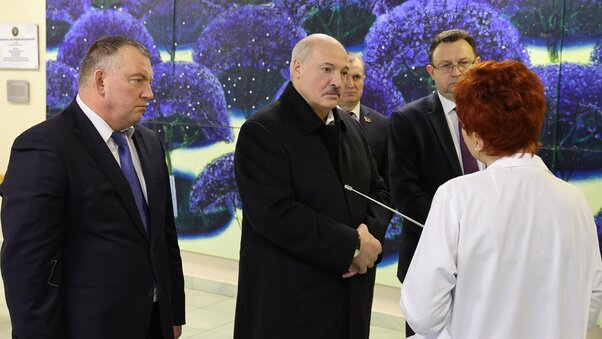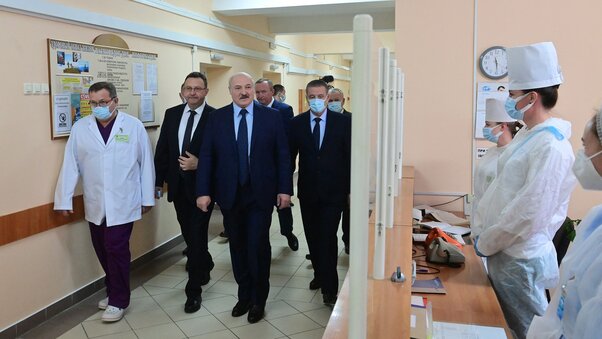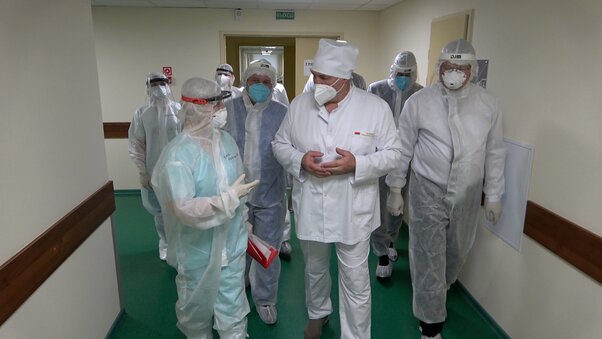Visit to Molodechno Central District Hospital
- 22
- 6
During his working trip to Minsk Oblast on 12 March Belarus President Aleksandr Lukashenko visited the Molodechno Central District Hospital.
The head of state asked about the arrangement of the health service delivery in the region, including in the context of development of inter-district medical centers. The president was told that the Molodechno Central District Hospital has more than 1,000 beds. The hospital is an umbrella organization for a number of healthcare facilities, including the Radoshkovichi Municipal Hospital, a maternity hospital, community hospitals, rural hospitals, and an outpatient polyclinic network. The Molodechno Central District Hospital serves a community of more than 136,200 people. An inter-district center to provide tertiary medical care for residents of Molodechno District, Vileika District, Volozhin District and Myadel District will soon be up and running.
Aleksandr Lukashenko recalled his instruction to build a clear-cut vertical structure of healthcare institutions, from rural hospitals to teaching hospitals, to make cutting-edge medical care available at the grassroots level whenever possible, and to develop inter-district centers in large towns like Molodechno.
“Eleven inter-district centers based in large towns like Molodechno, Borisov, Soligorsk, Bobruisk, Lida, Baranovichi...Regional hospitals should delegate some of their functions to inter-district centers. All people want to receive qualified medical care,” the president stressed.
The head of state also discussed health service delivery for patients with COVID-19. Aleksandr Lukashenko was informed that the Molodechno Central District Hospital re-purposed 335 beds to treat patients with infectious diseases, which is 32.5% of its bed capacity. Some 3,600 patients with COVID-19 were treated in hospital, 5,200 people received outpatient care. A CT scan, two ventilators, an anesthesia machine and other types of equipment were purchased to treat coronavirus patients.
Aleksandr Lukashenko said that it is necessary to retain departments that can be re-purposed to treat infectious diseases if necessary.
Head of the Molodechno Central Regional Hospital Daria Kolyadich said: “We have 29 anesthesia machines, 27 intensive care beds, of which 15 are for COVID-19 patients.”
According to her, an oxygen distribution station has been built and put into operation at the hospital. Currently, there are 217 infectious diseases beds in operation; 118 beds were returned to routine use. We have a month’s stock of medicines to treat coronavirus patients, personal protective equipment, and reagents.
“So, you have learned to treat coronavirus not worse than other hospitals in the country,” the president assumed.
The head of state studied the way health services are delivered at the hospital and the clinic’s infrastructure. He also visited the red zone, where patients with COVID-19 are treated, and talked to the personnel of the hospital.
“Thank you for learning how to treat people with coronavirus. You did not know anything about the virus. Today we know how to deal with it,” the president stressed speaking about the coronavirus pandemic. Aleksandr Lukashenko warned against letting the guard down as “this virus has not gone away yet” and urged to continue following the hygiene guidelines.
The head of state also spoke positively about the work of the medical staff of the Molodechno Central District Hospital. “In Molodechno, doctors, nurses and junior staff show a fairly high level of work. It is great,” the president said. In his words, in 11 large cities there are inter-district medical centers similar to the one at the Molodechno Central District Hospital. “I think they have the same healthcare level,” the Belarusian leader said.
The president also mentioned the detection of first cases of the UK COVID-19 variant in Belarus. “There is no need to panic. We have been preparing for this, discussing the problem and we know what to do. You [healthcare workers] know what to do, too. The main thing is not to panic. We will pass all these waves calmly,” he stressed.
One of the questions was about the employer-sponsored education program. Now it applies to doctors who will be sent to work in rural areas and small settlements with a population under 20,000. Aleksandr Lukashenko agreed that there is no need to put limits to the program and that it needs to cater to the needs of other towns.
"We will do it. I know the problem. It is not the first time that it has been raised," the president said.
The head of state recalled that the decision to roll out the employer-sponsored program for small settlements aimed to address a serious problem of personnel shortage. “That was why we gave it a try. But the approach is wrong. We see it now. Why do we restrict it to towns of 20,000. Why places with 70,000-100,000 and more are off limits? We need to approach this problem more specifically. For example, Molodechno needs three doctors, so the city authorities, on your proposal, will make a decision to enroll them into such program (public organizations will be involved in this process too). You pick them up, and you bear responsibility for them. The employer-sponsored program should enroll those you see worthy, those who will become good doctors," the Belarusian leader stressed.
Aleksandr Lukashenko believes that the employer-sponsored program should not be limited to small towns and villages. "Maybe Minsk needs this program too. Sponsored students are obliged to take up a job in the institution that has placed them into this program," he said.
The president also said that issues of higher education will soon be revised at the level of the head of state soon: "We will analyze things. It's not just about medical training. We will look at employer-sponsored education in all areas. And I am not a supporter of limiting it to professions and specialties"
"We will soon return to centralized testing issues, which I have talked about a lot. Proposals have already been made. We will also look into employer-sponsored education," the head of state added.
One of the hospital’s employees wondered about Aleksandr Lukashenko’s opinion regarding voluntary health insurance of individuals.
“If it was done on a mass scale, we would appreciate our good health,” Aleksandr Lukashenko said. He referred to the USA as an example where dozens of millions of people have no health insurance and it costs a lot of money. The situation is different in Belarus where healthcare is free and people sometimes pay less attention to their own health. “One should mind his or her own health,” Aleksandr Lukashenko advised.
As far as health insurance is concerned, the practice is gradually gaining traction in Belarus. According to the head of state, the number of Belarusians, who opt for voluntary health insurance, has doubled over the course of five years and now exceeds 0.5 million people. Meanwhile, the Belarusian state healthcare system demonstrated its effectiveness during the pandemic period, too. The state spends heavily on it.
“We follow the same principle. And as you can see it works. Time will pass, we will evaluate and reevaluate all of this. As I often say, we don’t sort people. The way people are sorted in rich countries. Thank god, we don’t do that. Certainly, there are moral considerations and material ones involved. Like Slavs we work together to help a sick person recover,” Aleksandr Lukashenko pointed out.
“People buy health insurance policies just in case. On the whole, we treat everyone for free,” he remarked. “I am in no rush to switch everyone to the so-called insurance healthcare.”
“We have to proceed gradually. The revolutionary way [of development of insurance healthcare] won’t work. It would be very painful,” Aleksandr Lukashenko is convinced. “When there is discipline and order in the country, things will work out. This is why you shouldn’t rush to break what you’ve created with your own hands. We will gradually encourage the [health insurance] practice but we are not going to radically remodel things. Not everyone has the means for it and not every enterprise can set aside money for it.”
According to the president, the production of the Russian vaccine is to be launched in Belarus by the end of March. “We will start producing the vaccine in late March. I really hope that in the second half of this year we will not just produce vaccines using Russian technology, but will also roll out our own. The work on it is underway using our premises and our technologies,” the president said.
Aleksandr Lukashenko also mentioned the deliveries of a Chinese vaccine to Belarus, He noted that this vaccine got a positive feedback internationally. “In other words, we will offer you various vaccines,” he said.
“Don’t worry about getting a vaccine. We will protect our people whatever it takes,” the Belarusian leader emphasized.
Speaking about possible plans to get a vaccine shot for himself, the president said: “I hope that I still have antibodies, although pretty much time has passed since August. I need to check. I hope for the best and don’t panic. I cannot afford going into the panic. If the president starts panicking, you will follow suit, and then all people. I made a decision that since I have antibodies, I do not need to be vaccinated. But the time will come and I will have to.”
In conclusion, he wished everyone good health.


